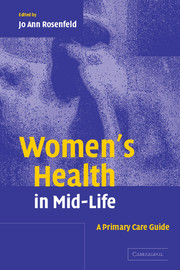Book contents
- Frontmatter
- Contents
- List of contributors
- 1 Introduction
- Part I Health promotion
- Part II Hormonal changes
- Part III Disease prevention
- Part IV Cancer prevention
- 16 Breast cancer: screening and prevention
- 17 Cervical cancer: prevention, screening, and early detection
- 18 Endometrial cancer: prevention, screening, and early detection
- 19 Ovarian cancer: prevention, screening, and early detection
- 20 Colon, lung, and skin cancer: screening and prevention
- 21 Common gastrointestinal and urinary problems
- Index
- References
21 - Common gastrointestinal and urinary problems
from Part IV - Cancer prevention
Published online by Cambridge University Press: 21 August 2009
- Frontmatter
- Contents
- List of contributors
- 1 Introduction
- Part I Health promotion
- Part II Hormonal changes
- Part III Disease prevention
- Part IV Cancer prevention
- 16 Breast cancer: screening and prevention
- 17 Cervical cancer: prevention, screening, and early detection
- 18 Endometrial cancer: prevention, screening, and early detection
- 19 Ovarian cancer: prevention, screening, and early detection
- 20 Colon, lung, and skin cancer: screening and prevention
- 21 Common gastrointestinal and urinary problems
- Index
- References
Summary
Common gastrointestinal problems
The most common gastrointestinal (GI) complaints are constipation, diarrhea, and irritable bowel syndrome (IBS). Although often limited and innocent, a change in bowel habits or blood in or around the stool can be linked to an increased risk for colon cancer, and is therefore serious.
Constipation
Constipation is the most common GI complaint, accounting for 2.5 million visits in the USA yearly. Approximately 2–13% of individuals complain of constipation, with higher incidences in women, African-Americans, people older than 60 years, and those with less activity, low income, and less leisure activity.
Each individual's normal bowel pattern is different. However, constipation can be defined as no bowel movement in more than three days, hard stools, difficulty or pain with evacuation, abdominal pain, and bloating. Most episodes are limited.
Etiology
Low fiber intake and poor diet can cause constipation. Medications also can lead to constipation (Table 21.1). Constipation is associated with many metabolic and endocrine disorders, including hypocalcemia, renal failure, hypothyroidism, hyperparathyroidism, and diabetes. Neurological disorders can impede normal GI movement; multiple sclerosis, strokes, and spinal cord injury can cause constipation. Malfunction or anatomical abnormalities, including colitis, cancer, diverticular disease, and rectal prolapse, can cause constipation.
Evaluation
Evaluation of constipation is necessary if it is new, associated with cramps, severe pain, or fever, or if the stool contains blood or mucus. Evaluation includes a white blood count and hematocrit, C reactive protein or erythrocyte sedimentation rate, and either a double-contrast barium enema or colonoscopy.
Keywords
- Type
- Chapter
- Information
- Women's Health in Mid-LifeA Primary Care Guide, pp. 335 - 356Publisher: Cambridge University PressPrint publication year: 2004

